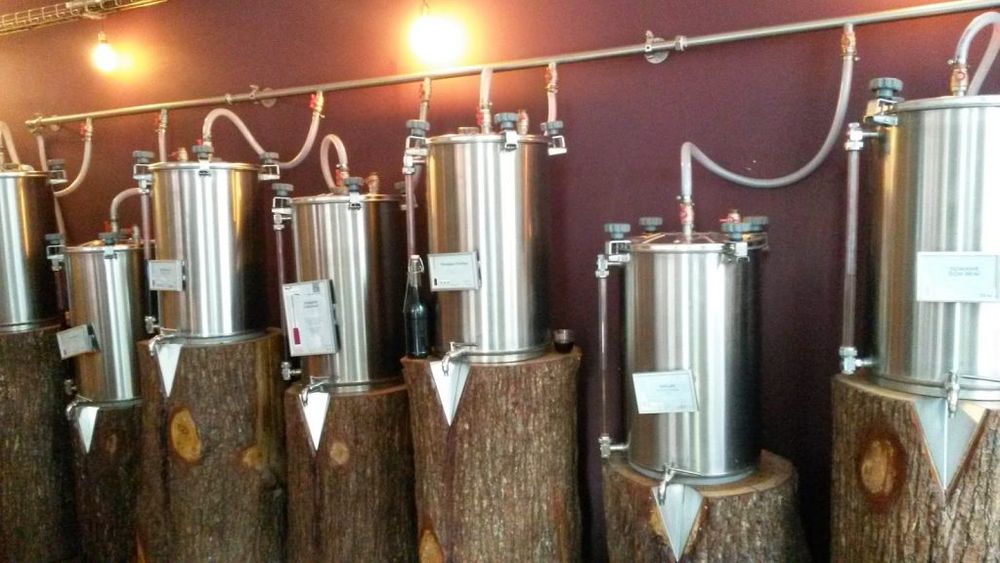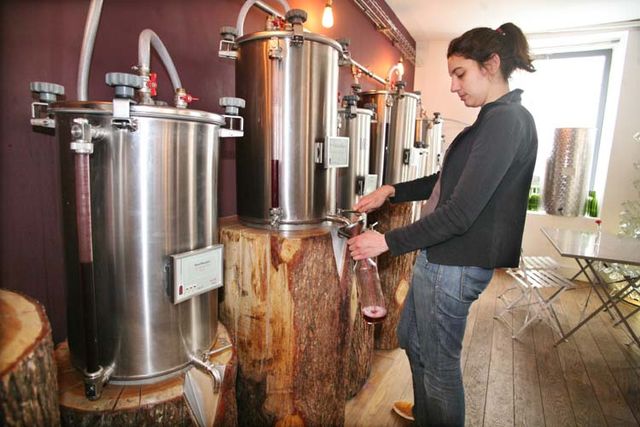Bulk wine no longer has the stigma it once had. For those in the know it can give on-trade buyers far better control of the prices and the wines and the list they offer their customers.

It is often hard to be able to fully appreciate how much the sector you work in has changed when you are in it, day in day out tackling the various challenges week by week. But if it is often a usual exercise to stop and step outside our bubble and reflect on not only how you and your business have changed to cope with different times, but how the sector as a whole has had to adapt and move just to go forward.
The role of a wine buyer is no different. In fact the pace of change taking place within how wine is being bought and sold around the world is an exercise we should be doing on a yearly rather than five or 10 year cycle.
Let’s just look at bulk wine and how its image and perception has been transformed say in the last five years. It has gone from hushed conversations between producers and buyers and wine importers at industry events and dinners, to become arguably one of the most important driving forces and influences on the entire wine industry.
The amount of bulk wine now being shipped around the world compared to just five years ago is staggering. It has transformed the fortunes of New World countries in particular with Australia, South Africaand Chile leading the way. Over four-fifths, for example, of all wine being shipped from Australia to the UK is now being sent in bulk. Over half of South Africa’s wine exports are in bulk. Chile’s enormous growth in China in the last few years has largely come on the back of its demand for Chilean bulk wine.

The South African wine industry is putting in long term plans to switch the focus back from bulk wine and on to bottled wine exports
The swing towards bulk wine has been so fast and decisive in some countries that there are now steps being made to slow down the global industry’s reliance on bulk wine as it is resulting in lost jobs in bottling, packaging and manufacturing in those wine producing countries.
Genie is out of the bottle
But it might be hard battle to win. The genie, as it were, is out of the bottle. The wine industry’s overall perception of bulk wine has also changed dramatically. It has moved in step with the huge improvements that have been made in the safety, the technology, the quality and price point of wine that is now arguably better served by being shipped and then bottled in a seller’s market.
It is sign of how mature and sophisticated the bulk wine industry has become that buyers of all types of wine, outside the most premium and fine wines, are now looking closely at what bulk wine can offer.
It is changing the way that traditional wine importers, suppliers and distributors can operate. Meaning the end buyer in the on-trade, be it a sommelier or operations manager for a restaurant, gastro pub or casual dining chain is now being offered wine very different to only two or three years ago.
It all rests on the huge improvements that have been made in the quality of bulk wine now available on the global market.
It means wine suppliers, no longer have to be just simply agents for other people’s wines. They can become brand creators, brand builders and trendsetters themselves. They can now buy and use wine they have sourced and blended themselves to be economically and efficiently shipped and bottled in their domestic market.
It means wine suppliers no longer have to follow the agency route, reliant on the quality and export strategy of the wine producers they work with.
Take back control
They can, to coin a phrase, take back control of their own supply chain. Or in most cases grasp control of their own supply chain for the first time.
The timing could not be better as wholesalers, suppliers and on-trade buyers grapple with one of the most disruptive trading and economic conditions in recent memory, fuelled by the political uncertainty both in the United States and across Europe.

Inverarity’s Toby Sigouin is now looking to develop its own brands by sourcing with bulk wine
It is interesting to see how different wholesalers and distributors are now working with bulk wine to change their ranges and work much closer with their on-trade customers. Take Scottish drinks wholesaler and wine supplier, Inverarity Morton. It is now using bulk wine far more to go direct and create its own wine brands to sell.
It opens up so many more possibilities for how their business can grow and develop, says wine buyer, Toby Sigouin. The quality of bulk wine at much higher price points means it is now able to get closer to not only wine producers by making wine directly with them, but also their own customers.
You can now go to them, he adds, with stories and wines that you have personally created yourself, wines that potentially have so much more energy and passion behind them than if you were acting as a third party supplier.
The fact they are produced using bulk wine is not relevant or important to Inverarity Morton’s customers or the end consumer.
Opportunity for on-trade groups
The same opportunity to go direct also applies for wine bar, restaurant or pub groups. They too can look to go direct and create exclusive wines direct with producers. And we are not just talking about buying huge tankers and flexitanks of wine here.
Going direct and opening up to new ways of sourcing means wine can be shipped in mini kegs or tanks to be sold in restaurants and bars used for wine on tap or bag in the box.

The En Vrac system is being used in wine bars in Paris to add theatre and a point of difference
Wines served via mini tanks, or taps have become quite a common feature in wine bars in Paris, New York, San Francisco and other agenda setting cities. Like the En Vrac system above.
We are also seeing it increasingly in the UK too. Vinoteca was arguably the first to give keg and bag in the box wine a go and has for a number of years being offering its customers a choice of unusual grape varieties sourced direct from wineries in France and across Europe.
We have already assessed the benefits that the keg-based wine on tap offer that M Restaurants has introduced at its site in Victoria in conjunction with Hatch Mansfield. A system that means the equivalent of 40 plus glass bottles and 20kg of glass can all be contained in a single keg that would sit easily in to a cupboard under the average kitchen sink.
We are seeing a similar picture emerge in the independent merchant, wine bar and restaurant scene. Particularly when looking to source exclusive, quality, but value wines at competitive house wine-style prices. Wine merchants are coming together far more to form buying associations, like The Vindependents, where they can club together to source quality, value juice that can be shipped for them to bottle, and label differently for their different stores and wholesale businesses. Particularly when trying to find good value, quality house wines to offer their restaurants and on-trade customers.
Where next for specialist national distributors?
Larger distributors are able to do the same on a bigger scale when it comes to the actual buying, shipping and bottling. But again it is giving them much more of a personal story and approach when going in to talk to their customers about offering them exclusive wines, that offer quality, consistency and at the right price point.
Up to now our major specialist national wine distributors, like the likes of Liberty Wines and Hallgarten Druitt, have played down the role of bulk wine for their own businesses. But with uncertainty around the value of the pound and the inability to be able to plan effectively more than six months ahead it is surely an area they are going to have to consider.
Not only would our major national distributors be able to lock in good value wine, particularly at the most competitive price points, but it would bring back levels of certainty to their business and supply chain that currently they can’t control. We shall have to watch this space on that, but it could be one of the interesting trends to follow as we go through 2017.
Wherever you sit in the wine buying supply chain it is worth reflecting on the most important issues, challenges and opportunities that directly effect you and assessing how well you are doing to address them against your competition. If you don’t the chances are they will.
- This is an adapted and expanded article from one that first appeared on VINEX, the online global trading site for bulk wine.









































